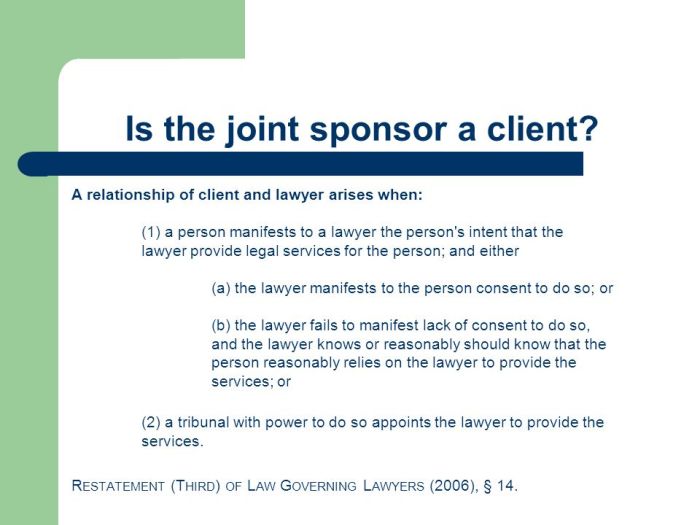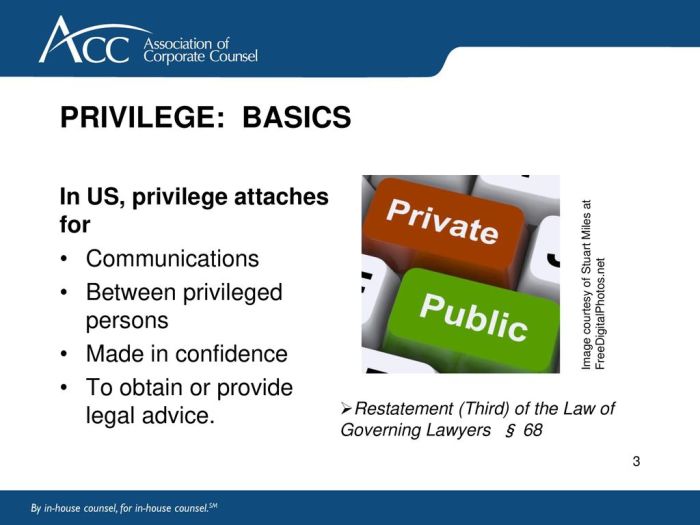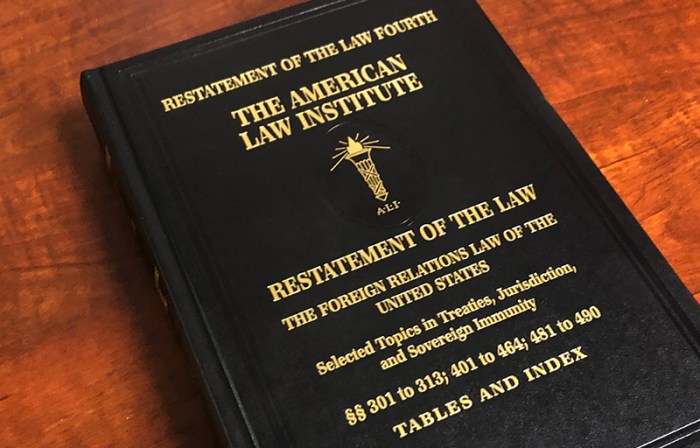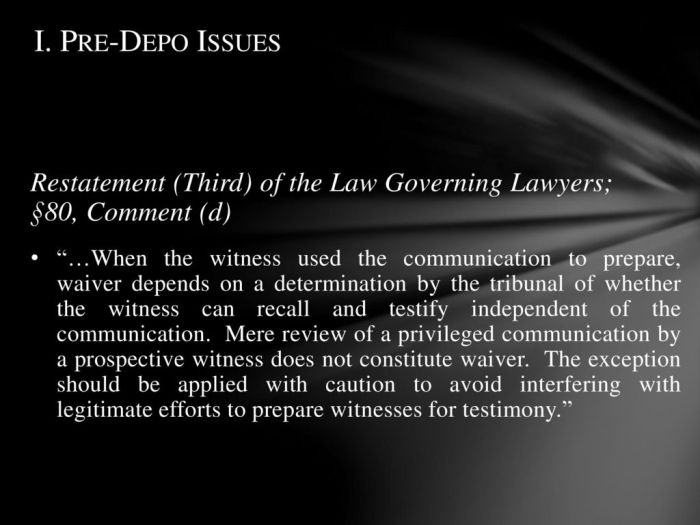The Restatement of Law Governing Lawyers, a comprehensive treatise on the ethical and legal obligations of attorneys, serves as an indispensable resource for legal professionals seeking guidance in navigating the complex landscape of their profession. This seminal work, meticulously crafted by the American Law Institute, provides a thorough examination of the duties, responsibilities, and ethical considerations that shape the practice of law.
Within its pages, the Restatement elucidates the fundamental principles governing the lawyer-client relationship, emphasizing the paramount importance of loyalty, competence, and confidentiality. It delves into the intricacies of professional responsibility, exploring the sources and key tenets that guide attorneys in upholding the highest ethical standards.
Restatement of Law Governing Lawyers

The Restatement of Law Governing Lawyers is a comprehensive treatise that sets forth the general principles of law that govern the conduct of lawyers. It was developed by the American Law Institute (ALI) and first published in 1990. The Restatement has been cited by courts in all 50 states and has been influential in shaping the development of the law governing lawyers.
History and Development
The Restatement of Law Governing Lawyers was the culmination of a decades-long effort by the ALI to develop a comprehensive statement of the law governing lawyers. The project was begun in the early 1960s and involved a team of lawyers, judges, and academics.
The Restatement was finally published in 1990 and has since been revised several times.
Purpose and Scope
The purpose of the Restatement of Law Governing Lawyers is to provide a clear and concise statement of the law governing the conduct of lawyers. It is intended to be a resource for lawyers, judges, and law students, and it has been cited by courts in all 50 states.
The Restatement covers a wide range of topics, including the duties of lawyers to their clients, the lawyer-client relationship, professional responsibility, and legal malpractice.
Use of the Restatement
The Restatement of Law Governing Lawyers has been used by courts to interpret and apply the law governing lawyers. For example, the Restatement has been cited by courts in cases involving conflicts of interest, confidentiality, and legal malpractice.
Duties of Lawyers: Restatement Of Law Governing Lawyers

Lawyers have a number of general duties to their clients, including the duty of loyalty, the duty of competence, and the duty of confidentiality.
Duty of Loyalty
The duty of loyalty requires lawyers to act in the best interests of their clients. This means that lawyers must avoid conflicts of interest, must not disclose client confidences, and must not use their position to take advantage of their clients.
Duty of Competence
The duty of competence requires lawyers to provide competent legal services to their clients. This means that lawyers must have the knowledge, skill, and experience necessary to handle their clients’ cases.
Duty of Confidentiality, Restatement of law governing lawyers
The duty of confidentiality requires lawyers to keep their clients’ confidences confidential. This means that lawyers cannot disclose client confidences without the client’s consent.
Exceptions to the Duties
There are a few exceptions to the general duties of lawyers. For example, lawyers may be required to disclose client confidences if they are subpoenaed to do so or if they believe that the client is planning to commit a crime.
Lawyer-Client Relationship

The lawyer-client relationship is a fiduciary relationship. This means that lawyers owe their clients a high degree of care and loyalty.
Elements of the Lawyer-Client Relationship
The elements of the lawyer-client relationship include:
- Consent: The client must consent to the lawyer’s representation.
- Confidentiality: The lawyer must keep the client’s confidences confidential.
- Privilege: The client’s communications with the lawyer are privileged.
Types of Lawyer-Client Relationships
There are a number of different types of lawyer-client relationships, including:
- Traditional attorney-client relationship: This is the most common type of lawyer-client relationship. In this type of relationship, the lawyer represents the client in a specific matter.
- Corporate counsel relationship: In this type of relationship, the lawyer represents a corporation or other business entity.
- Government attorney relationship: In this type of relationship, the lawyer represents a government agency or official.
Ethical Issues in the Lawyer-Client Relationship
There are a number of ethical issues that can arise in the lawyer-client relationship, including:
- Conflicts of interest
- Confidentiality breaches
- Fee disputes
Professional Responsibility
Professional responsibility is the ethical obligation of lawyers to conduct themselves in a manner that is consistent with the highest standards of the legal profession.
Sources of Professional Responsibility
The sources of professional responsibility include:
- ABA Model Rules of Professional Conduct
- State bar rules
- Court decisions
Key Principles of Professional Responsibility
The key principles of professional responsibility include:
- Duty of competence
- Duty of loyalty
- Duty of confidentiality
Ethical Issues in the Practice of Law
There are a number of ethical issues that can arise in the practice of law, including:
- Conflicts of interest
- Confidentiality breaches
- Fee disputes
Legal Malpractice

Legal malpractice is a civil cause of action that arises when a lawyer breaches a duty owed to a client and the client suffers damages as a result.
Elements of a Legal Malpractice Claim
The elements of a legal malpractice claim are:
- Duty: The lawyer must have owed a duty to the client.
- Breach: The lawyer must have breached the duty.
- Causation: The lawyer’s breach of duty must have caused the client’s damages.
- Damages: The client must have suffered damages as a result of the lawyer’s breach of duty.
Defenses to Legal Malpractice Claims
There are a number of defenses to legal malpractice claims, including:
- Statute of limitations
- Lack of causation
- Contributory negligence of the client
Remedies for Legal Malpractice
The remedies for legal malpractice include:
- Damages
- Injunctions
- Disbarment
Question Bank
What is the purpose of the Restatement of Law Governing Lawyers?
The Restatement serves as a comprehensive guide to the ethical and legal obligations of attorneys, providing a framework for understanding their duties and responsibilities.
What are the key principles of professional responsibility Artikeld in the Restatement?
The Restatement emphasizes the importance of competence, loyalty, and confidentiality as fundamental principles guiding attorneys in their professional conduct.
How can the Restatement assist attorneys in avoiding legal malpractice claims?
By adhering to the ethical and legal standards Artikeld in the Restatement, attorneys can minimize the risk of legal malpractice claims by ensuring that their actions align with their professional responsibilities.